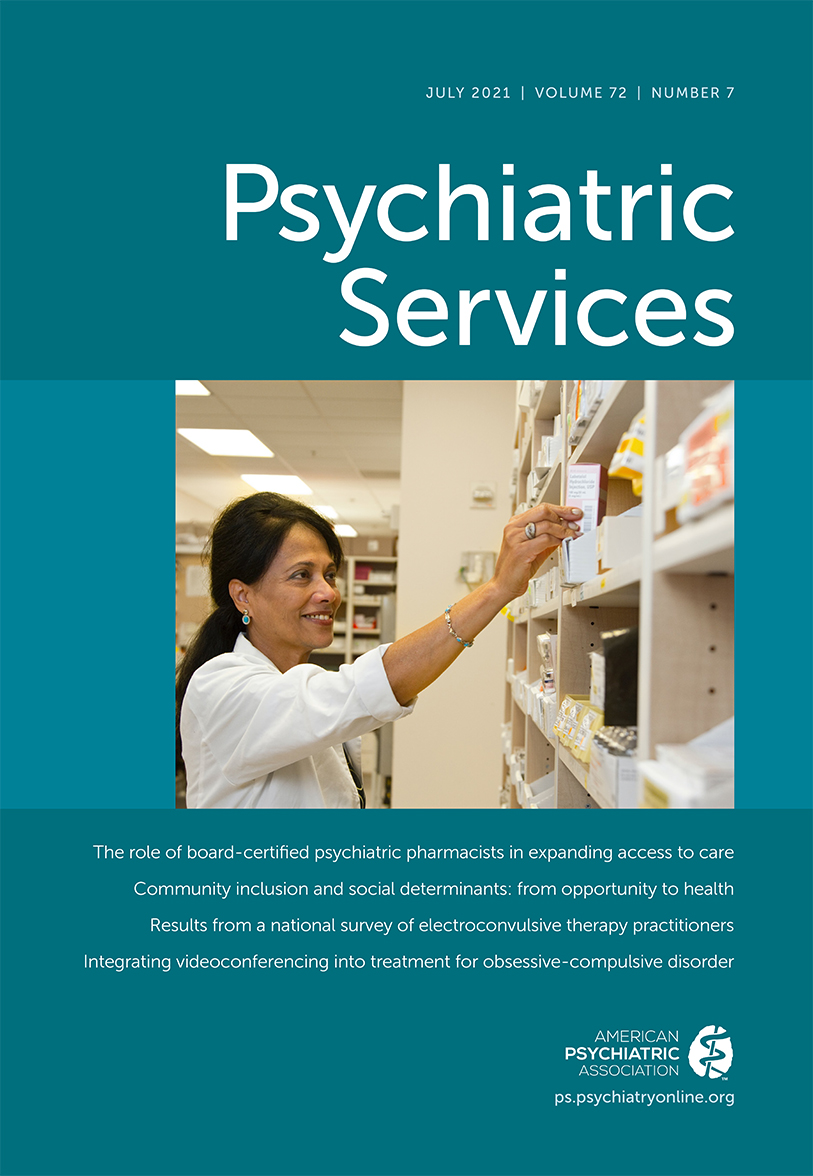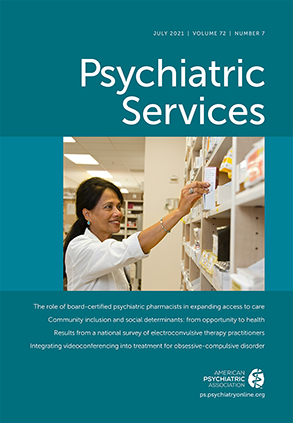Although CoCM can improve outcomes (
8–10), sustainability and scale of this model have been limited by poor reimbursement under traditional fee-for-service payment methods (
11,
12). To create an alternative method for reimbursing providers for CoCM and other forms of behavioral health integration (BHI), Medicare introduced CoCM and general BHI billing codes nationwide in 2017 (
13,
14). BHI is particularly critical for Medicare, which is responsible for the health of millions of elderly individuals with chronic diseases and depression. Little is known about CoCM and general BHI utilization. The only study conducted to date used a 5% sample of Medicare beneficiaries, and its findings suggest low CoCM and general BHI uptake (
15), indicating a dearth of knowledge and insight into BHI service provision nationwide.
Methods
CoCM is reflected in three billing codes that involve treatment and care coordination among a clinician who treats patients for both medical and behavioral health conditions, a behavioral health manager, and a psychiatric consultant. Healthcare Common Procedure Coding System (HCPCS) code G0502 was introduced in 2017 to reflect initial CoCM consultation (for 70 minutes, usable once per beneficiary) and was replaced in 2018 by Current Procedural Terminology (CPT) code 99492 (
16). Similarly, HCPCS code G0503 was used in 2017 to reflect subsequent CoCM services (for ≥60 minutes, usable once per month per beneficiary) before being replaced by CPT code 99493 in 2018. In 2018, CPT code 99494 was introduced to reflect an additional 30 minutes of CoCM services, billable up to twice monthly per beneficiary.
The general BHI code—which is meant to encompass all other BHI models and is therefore less prescriptive than CoCM in terms of requisite team members and functions—encourages clinicians to deliver at least 20 minutes of general integrated behavioral health services per month. In 2017, general BHI corresponded to HCPCS code G0507, which was replaced in 2018 by CPT code 99484. Although Medicare does not exclude psychiatrists as billing providers, CoCM and general BHI codes are intended to be used by the clinicians who provide care for medical and psychiatric diagnoses (
17).
We used 2017–2018 Medicare claims data capturing 100% of CoCM and general BHI services delivered by physicians to Medicare patients nationwide (
18). We calculated service counts and payments for CoCM (HCPCS codes G0502 and G0503 in 2017 and CPT codes 99492, 99493, and 99494 in 2018) and general BHI (HCPCS code G0507 in 2017 and CPT code 99484 in 2018), as well as counts and payments for denied claims (i.e., services billed by clinicians but not reimbursed by Medicare). We also analyzed the data by site of service: office based (i.e., outpatient practice), home based (i.e., home, assisted-living facility, or custodial-care facility), skilled nursing facility (SNF), and other (all other sites).
Finally, we evaluated use and payment by clinical specialty, comparing use by PCPs (internal medicine, family medicine, general practitioners, and geriatric medicine physicians), psychiatrists, and clinicians in other specialties. Because of an unexpectedly large number of services provided in 2018 by pediatricians through one carrier, most of which were denied payment, we repeated the analyses by excluding CoCM and general BHI billed from this specific carrier. All analyses were performed in SAS, version 9.4. Institutional review board approval was not obtained because all data were publicly available in aggregate, deidentified form.
Results
Overall, 10,294 CoCM and general BHI services were delivered in 2017, totaling $626,292 in payments, and 81,433 CoCM and general BHI services were delivered in 2018, totaling $7,442,985 in payments (
Table 1).
Medicare denied claims for 5% of all CoCM and general BHI services in 2017 and 32% in 2018, representing $62,404 and $3,094,703 in potential payments, respectively. In 2017, general BHI represented most services (8,520 vs. 1,774 of CoCM), and this pattern was reversed in 2018 (56,579 of CoCM vs. 24,854 of BHI). In 2018, notably, denials of claims were more common for CoCM than for general BHI (42.8% [24,190 of 56,579] vs. 7.5% [1,852 of 24,854], respectively) and varied by CoCM code (30.6% [4,429 of 14,470] for CPT 99492, 65.0% [10,994 of 16,921] for CPT 99493, and 34.8% [8,767 of 25,188] for CPT 99494). Denials were lower in 2017 for CoCM (6.1% [115 of 1,889]) and general BHI (4.8% [425 of 8,945]).
Most general BHI services were rendered in office-based settings in both 2017 (89.0%, 7,581 of 8,520 services) and 2018 (76.4%, 18,989 of 24,854 services). SNF was the second most common site of service with 448 (5.3%) delivered in 2017, and home-based visit was the second most common site of service, representing 2,110 (8.5%) services in 2018. Office-based settings were also the most common service site for CoCM services (81.0%, 1,436 of 1,774 services in 2017, and 90.9%, 51,431 of 56,579 services in 2018); the next most common were home-based settings in both years (18.0%, 319 services in 2017, and 4.3%, 2,452 services in 2018).
Over 2 years, use of CoCM and general BHI varied by clinical specialty. PCPs delivered 34.0% (31,226 of 91,727) of total CoCM and general BHI services, 9.8% (2,592 of 26,582) of which were denied payment. Among other specialties, psychiatrists delivered the most general BHI services (N=4,245, of which 3.9% [N=167] were denied payment), and pediatricians delivered the most CoCM services (N=41,291, all in 2018, 21,080 [51.1%] of which were denied payment).
Overall, 79.3% (21,080 of 26,582) of denied CoCM services in 2018 were delivered by pediatricians, nearly all originating from one carrier in Harris County, Texas. Excluding claims from that carrier, 17,063 CoCM services were delivered over the 2-year period, totaling $2,117,467 in payments. Medicare denied claims for 18.2% (3,111 of 17,063) of these services, representing $542,371 in potential payments. Office-based settings comprised most (66.3% [10,143 of 15,289]) of CoCM services in 2018, followed by home-based settings (16.0% [2,452 of 15,289]) and SNF (8.1% [1,239 of 15,289]). Over the 2 years, PCPs delivered 11,374 (66.7%) CoCM services, 1,885 (16.6%) of which were denied payment. Psychiatrists delivered 1,387 (8.1%) of the CoCM services, 224 (16.2%) of which were denied payment.
Discussion
To our knowledge, this is the first study that comprehensively describes CoCM and general BHI service use among Medicare patients nationwide. Our findings indicate that the use of these billing codes increased eightfold between 2017 and 2018 and that a notable number of claims for these services were denied in 2018. Our findings reveal three major practice and policy implications.
First, our analysis underscores the key roles of PCPs and psychiatrists in using new codes to support BHI—an encouraging finding given Medicare’s intention to continue promoting CoCM and general BHI codes. The fact that CoCM was most often billed by PCPs with involvement of psychiatric consultants reflects use consistent with the intent of the program. That some psychiatrists also billed Medicare for these services suggests variation in how clinicians worked together to deliver and bill for behavioral integration and the need for additional analyses to evaluate these dynamics.
Second, we observed low uptake of these codes relative to the number of potentially eligible patients nationwide and considerable claim denial rates, both of which highlight the salience of infrastructure and workflow barriers to achieving integrated behavioral health, such as those reported among CoCM adopters (
7). An estimated 14.3% of adults in the United States experience mental illness that is not classified as serious mental illness (
19) and therefore may be eligible for CoCM services. Applying this figure to Medicare beneficiaries, approximately 8 million could benefit from CoCM services annually (
20).
On the basis of a qualitative analysis of early use (
7), barriers to CoCM implementation include evidence of patient consent provided by the billing clinician (most often a PCP), demonstration of financial sustainability (often either supplanting or supplementing traditional fee-for-service billing for psychotherapy services), and variability of payers accepting the codes. Restricting CPT code 99494 to twice monthly may also limit the ability to deliver adequate CoCM to patients with complex conditions. Additional research is needed to evaluate implementation barriers and drivers of claim denial rates.
Third, although most general BHI and CoCM services were provided in office-based settings, a substantial proportion was rendered in SNF and home-based settings. Citing the need for access to behavioral health services across care settings, Medicare did not restrict the site of service for delivering CoCM and general BHI services (
16). Their use in nonoffice settings is encouraging, indicating delivery of behavioral health services outside of traditional office visits and highlighting the role of psychiatrist input across a range of settings.
This study’s limitations include its descriptive design and the lack of granular practice- and patient-level data, including information about the full range of providers participating on clinical teams to deliver CoCM and general BHI services. Reasons for denial of claims were also not available. Additionally, the large proportion of CoCM services billed by pediatricians through one individual carrier was unexpected, and additional investigation is needed to evaluate drivers of this use, which may include care provided by dually boarded physicians, care of pediatric patients covered by Medicare, or erroneous billing.

